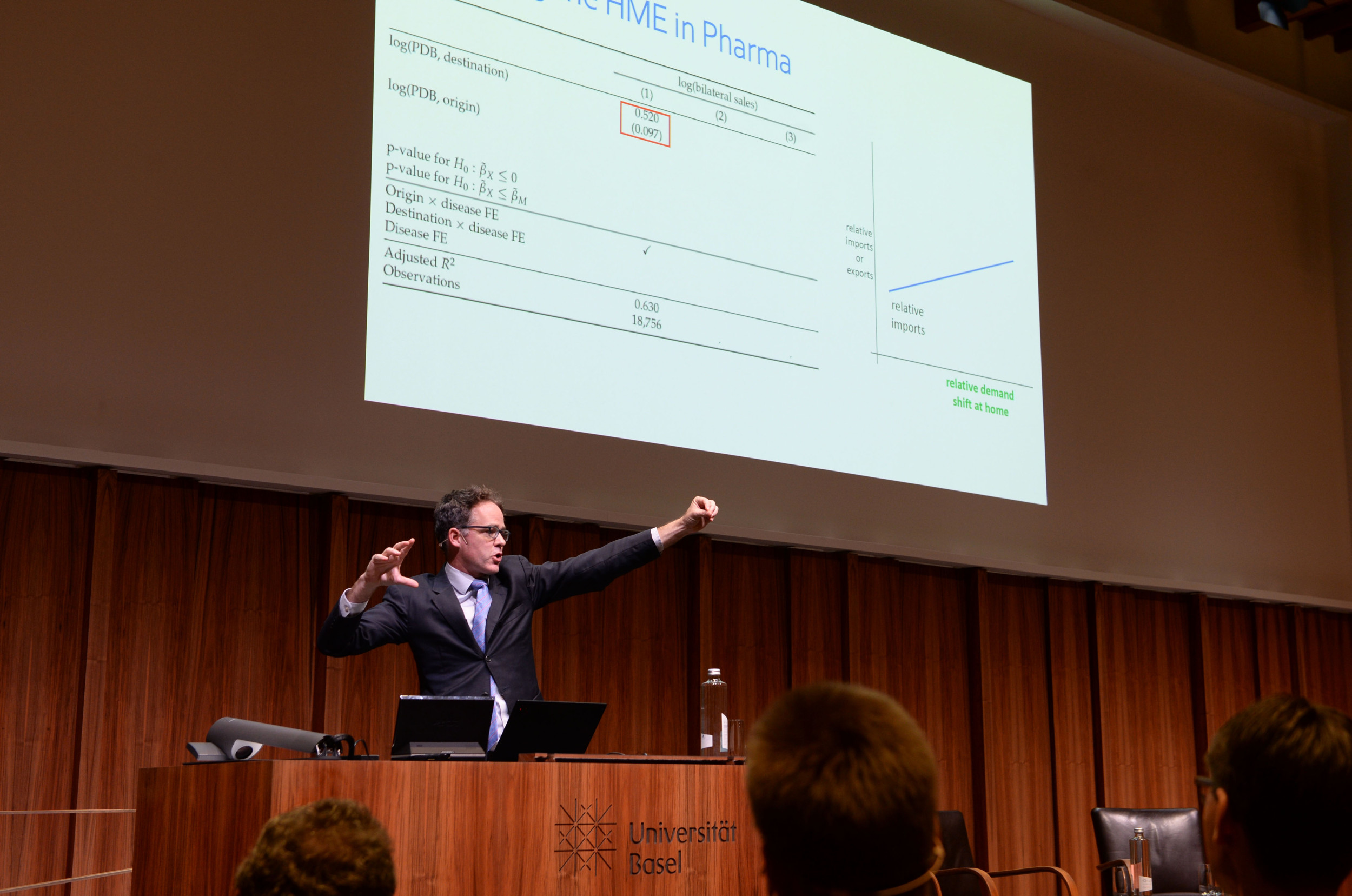Der Vortrag ist Teil der "Vortragsreihe über Innovation in der globalen Wirtschaft". Die Vortragsreihe bietet eine Plattform für renommierte Forscher aus Wirtschaft und Ökonomie, um ihre Forschungsergebnisse und Gedanken zum Thema "Innovationen in der globalen Wirtschaft" einem breiten Publikum vorzustellen. Die Veranstaltungen befassen sich mit den Herausforderungen der Globalisierung und neuer Technologien für Gesellschaft, politische Entscheidungsträger und Unternehmen.
Dritte Vorlesung: Wie wichtig ist die Größe des Heimatmarktes für die Forschung in der pharmazeutischen Industrie und darüber hinaus?
Prof. Dave Donaldson / Referent
Klicken Sie hier, um mehr über Prof. Dave Donaldson zu erfahren
Class of 1949 Professor für Wirtschaftswissenschaften am Massachusetts Institute of Technology (MIT) in Cambridge (USA). Er lehrt und forscht auf dem Gebiet des internationalen und intranationalen Handels, mit Anwendungen in den Bereichen internationale Wirtschaft, Entwicklungsökonomie, Wirtschaftsgeschichte, Umweltökonomie, Stadtökonomie und Agrarökonomie. Er hat unter anderem die Auswirkungen der Marktintegration auf Wohlstand und Ungleichheit, die Auswirkungen von Verbesserungen der Verkehrsinfrastruktur und die Frage untersucht, wie der Handel die Auswirkungen des Klimawandels abmildern oder verschärfen kann. Diese Arbeit wurde 2017 mit der John-Bates-Clark-Medaille ausgezeichnet, die von der American Economic Association an den US-amerikanischen Wirtschaftswissenschaftler verliehen wird, "der im Alter von unter vierzig Jahren den bedeutendsten Beitrag zum wirtschaftlichen Denken und Wissen geleistet hat", sowie mit einem Alfred-P.-Sloan-Forschungsstipendium und mehreren Zuschüssen der National Science Foundation.
The topic of pharmaceutical R&D and the importance of the home market attracted a diverse audience from academia and industry representatives to students of economics in the Aula of the Kollegienhaus at the University of Basel. Prof. Rolf Weder opened the event by highlighting the importance of the pharmaceutical industry as an innovation and manufacturing leader, for both Switzerland as a whole and the region of Basel in particular. He then introduced the speaker, Prof. Dave Donaldson of MIT as the co-author of the paper that inspired the event: “The More We Die, The More We Sell?” which was published in the Quarterly Journal of Economics in 2019.
Prof. Donaldson presented the main findings from the study by drawing on a (maybe suspiring) “twist” of textbook economics: in most standard market equilibrium models, the demand curve slopes downwards (people buy less when prices rise) and supply slopes upwards (firms want to sell more when prices rise). However, with the presence economies of scale, supply can also be downward-sloping. Economies of scale can occur in cluster regions where many firms of the same industry are closely located to each other, much like the pharmaceutical cluster in Basel. Whenever such economies of scale are present, the so-called home market effect may be observed: a large demand for certain goods in the home market leads to relatively lower prices and this makes it attractive to export that good. Hence, contrary to popular belief, more demand at home leads to more exports rather than imports of the good. The stronger the supply curve slopes downward, the stronger the home market effect becomes. The big question remains: what drives and changes local demand? For the case of pharmaceutical companies, Prof. Donaldson and his colleagues assumed successfully that demand for pharmaceutical drugs can be predicted using the demographic composition of a country. Simply speaking, certain diseases can be associated with certain age groups (for instance, Alzheimer’s is predominantly a disease occurring in older people). Using these predicted disease burdens, local demand for certain drugs can be predicted for each country. Using these demand-shifters, Prof. Donaldson finds strong evidence that countries tend to export those drugs for which they have a relatively high local demand. The home market effect exists as a statistical phenomenon in the pharmaceutical industry.
After the highly interesting presentation, a panel consisting of Prof. Donaldson, Dr. René Buholzer of Interpharma and Prof. Weder sought to critically mirror the findings of Prof. Donaldson with the practical reality of the pharmaceutical industry in Switzerland. Dr. Buholzer and a participant from the crowd both commented that Switzerland may be an outlier in these statistics as a small country with a small home market. Pharmaceutical companies in Switzerland produce for the whole world, not just the Swiss market. This was a welcome input, since it showed the different worldviews between trade economists and representatives from the industry. Prof. Donaldson pointed out that the home market may be very similar to other, related markets in terms of demand. For the case of Switzerland, the home market in terms of disease burdens is very similar to other European countries but that does not lessen the relative importance of the home demand. Hence, even if Swiss pharmaceutical companies produce for a global market, the relatively strong demand for certain drugs and treatments will still influence the direction of innovation and production towards those products. At least that is what the theory predicts and what the data tells us on average. Lastly, Prof. Donaldson referred to the importance of economies of scale on an industry level and how policy can support them. One major mechanism to why they occur is the spread of ideas within an industry cluster and this is why policy makers should subsidize the flow of ideas.
After the insightful and lively discussion, the panel participants and members from the audience continued their fruitful exchange at the apero.



